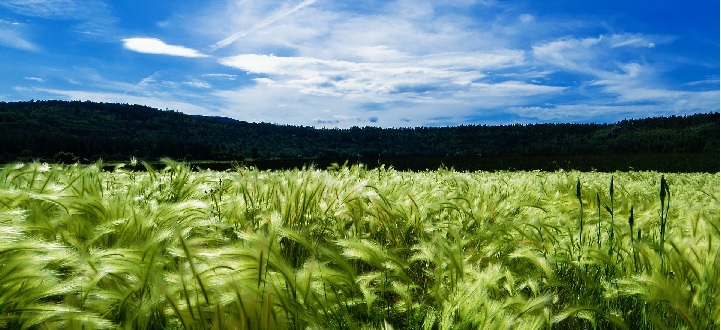Securing the future of our food
Posted on 2 June 2017
There's plenty of food on UK supermarket shelves, but supplies are under threat from global population growth and climate change, warn our researchers

We'll need 60 per cent more food by 2050 to feed the world's growing population
If buyers understand the impact of their choices on the environment, they can put pressure on suppliers to source other foodstuffs”
We’ve had a courgette crisis, lettuce rationing and warnings about a looming avocado shortage.
This shopping list of UK supermarket shortfalls is just the latest evidence of growing pressures on the food we eat.
And according to Bob Doherty, Professor of Marketing at York, if we don’t develop more sustainable food systems these minor supply ‘stresses’ and ‘shocks’ could be about to get a whole lot worse.
Global demand
“Global demand for food is predicted to increase by 60 per cent by 2050 to feed our growing population. At the same time, food production is under severe pressure from climate change, extreme weather, soil degradation, war and political instability. In the UK, Brexit is creating additional uncertainty.”
It’s a complex set of problems being explored by the IKnowFood research project, a £3.3m, four-year programme led by Professor Doherty and funded by the Global Food Security Programme.
Working with researchers at the Universities of Manchester and Liverpool, our 20-strong inter-disciplinary team is collaborating with farmers, manufacturers, supermarkets, consumers and industry bodies. They are exploring the reasons behind the growing pressures on the global food chain with the aim of developing new systems and technologies to ensure more sustainable supplies of nutritious, affordable food.
Professor Doherty admits that compared to areas of the world facing famine and drought, the issue of secure food supplies in the UK is unlikely to trouble many UK shoppers - yet.
“Where they might notice it in the UK,” he says, “is not so much with lack of food, but initially with increased prices.
“One of the problems is that much of the world’s food production is now concentrated in specific geographical areas, for example North America and the Russian Steppe. This concentration means that any negative impact on production can have huge impacts on commodity markets resulting in price spikes and other potential knock on effects that feed through to shoppers.”
Obstacles and solutions
IKnowFood takes a holistic look at the complex web of our global food system. The project explores the obstacles and solutions to the creation of a more resilient model that is better equipped to deal with increasing worldwide pressures.
The project is focused on UK food systems – but 50 per cent of our food is imported, so the research team is also exploring the pressures on global commodities and how these pressures affect the food on our supermarket shelves.
Soya for instance is 'problematic' for UK supermarkets, explains Professor Doherty. A hidden composite in food products and in animal feed, soya production is concentrated in countries such as Brazil where rainforests are being destroyed to meet growing demands for the crop.
Building on data already gathered at the University’s Stockholm Environment Institute, the IKnowFood researchers are developing input and output trade models for soya to track the effects of supply chain purchasing decisions.
“If buyers understand the impact of their choices on the environment, then they could put pressure on suppliers to source other foodstuffs,” says Professor Doherty. Similar models are planned for palm oil and wheat.
Farm technology
The team is also working with farmers on low cost sensor technologies to help with issues such as the early detection of crop disease or to identify the best time to harvest. “It’s about empowering farmers to make more informed decisions which increase food production more sustainably while reducing the environmental impact.”
Another research strand aims to use persuasive technologies such as mobile apps or websites to influence consumer behaviour. The persuasion could also take the form of information which ‘nudges’ shoppers towards healthier food by, for example, listing the time it would take to walk off the calories in a snack. The team are also interested in the links between social class and consumption behaviour related to food.
A forum for food
The final strand of the project aims to build a forum for industry, consumer and research bodies where the team can share data and test practical tools developed as part of the research.
“There is currently no forum for these groups,” explains Professor Doherty. “We believe that different parts of the food chain from farmers to supermarkets to policy makers all need to have an opportunity to share ideas and insights if we are to develop a unified understanding of food resilience.
“IKnowFood will provide the academic expertise and analysis to underpin these discussions, opening the possibility of new opportunities for building a more sustainable approach to food system resilience.”
IKnowFood is one of five food-related projects funded by the Global Food Security programme
The text of this article is licensed under a Creative Commons Licence. You're free to republish it, as long as you link back to this page and credit us.

Professor Bob Doherty
Research interests in enterprises which promote social welfare and reduce environmental degradation
Discover the details
Explore the IKnowFood project
The IKnowFood project includes researchers from our Departments of Health Sciences, Politics, Computer Science, the Environment Department, the School for Business and Society and the Stockholm Environment Institute. It is also supported by the York Environmental Sustainability Institute (YESI) and the N8 Agrifood Programme. We are also working with collaborators from the Universities of Liverpool and Manchester
Explore more research

A research project needed to spot trees on historic ordnance survey maps, so colleagues in computer science found a solution.

We’re using gaming technology to ensure prospective teachers are fully prepared for their careers.

A low cost, high-accuracy device, could play a large part in the NHS's 'virtual wards'.
